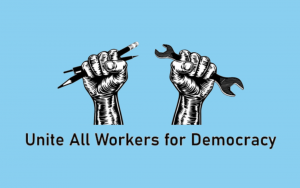Under capitalism, where does ostensibly “progressive” legislation come from? In other words, if the state is thoroughly and unconditionally dominated by the interests of the capitalist class, how is it possible that—occasionally—the state acts in ways that seem to be in the interest of the working class? Liberals and some otherwise well-intentioned democratic socialists answer largely in unison: If enough progressives are elected to positions of power, they will use the existing state machinery to implement programs of reform. FDR was elected president, the social welfare provisions of the New Deal—Social Security, infrastructure development, jobs programs, pro-labor union legislation, etc.—were passed. JFK and LBJ were elected president, civil rights legislation was the result. If Bernie Sanders is elected president, as a recent cover of Jacobin implies, poverty will be eliminated, and so on.
This answer is tied, implicitly or explicitly, to a theory of the state under capitalism. According to this theory, the state is independent, to a greater or lesser extent, of the economic system. The state has, as Theda Skocpol (following Max Weber) put it, “real autonomy.” Those who hold this theory often—but not universally—acknowledge the disproportionate influence of capital on the state, the role of popular mobilization in electing progressives, and even the eventual necessity of revolution. Nonetheless, the state—as an autonomous actor led by progressives—is considered the ultimate cause of progressive outcomes. In short, once elected, progressives do progressive things. If we would like progressive things to happen, it follows that we should put our energy into electing progressives.
Marxists have historically rejected these political implications by denying the accuracy of the theoretical premises on which they are erected. Lenin, for instance, argued that the state is the direct manifestation capitalist rule: The state is little more than a collection of capitalist-controlled “special bodies of armed men with prisons, etc., at their command.” The state, in fact, has no autonomy from the direct dictates of the capitalist class. It follows from this that the state can only be “reformed” through its destruction in the fire of revolution. Yet, while it is no doubt the case that capitalists often do unilaterally and directly control what the state does, we are still left with the problem posed at the outset: The state does occasionally act in the interest of the working class. How can a Marxist theory of the state account for this?
Disinvestment and Capital Mobility
It is mistaken, I suggest, to conceptualize the state as directly controlled by a perpetually class-conscious bourgeoisie. While this may be occasionally true, such a theory cannot explain the bulk of the capitalist state’s actions. Namely, it cannot explain why politicians are often compelled to act in ways that benefit the capitalist class regardless of their ideological commitments; indeed, even if they are ideologically anti-capitalist. Why are the socialist parties of Europe and Latin America constantly selling out the working class? Why are the most progressive state and local politicians in the United States constantly bucking their own rhetoric and betraying their principles? Are they all simply disingenuous, bureaucratized opportunists? Again, this may be true occasionally, but it is not a particularly convincing theoretical claim.
Rather, capitalists indirectly circumscribe the state’s actions. This indirect control is derived principally from capital’s ability to move or otherwise disinvest. To illustrate this point, let’s first assume, reasonably, I think, that elected officials have a general interest in maintaining their power. That is, elected officials have an interest in both remaining in office and in being reelected. It is extremely unlikely that an elected official will remain in office or be reelected if, during their tenure, they allow some economic catastrophe to occur. If unemployment rises substantially, for instance, it is unlikely that they will be reelected. Thus, elected officials have an interest in keeping employment levels high and in fostering a stable, if not booming, economy.
To accomplish this, though, progressive officials will likely have to temper their demands. All else equal, capital prefers to maximize its profits by keeping both taxes and wages low. Progressive or pro-working class policies tend to increase taxes and directly or indirectly increase wages. If elected officials successfully adopt such policies, capital can, and historically has, simply moved to places where such policies don’t exist. The jurisdiction with progressive policies loses jobs, and the progressive politician is blamed and is unlikely to be reelected. Thus, there is a perpetual compulsion among politicians—no matter their ideological commitments—to act in ways that capital prefers, in order to maintain and attract capital investment. In short, employment requires capital; capital is mobile; the state must attract capital through pro-capitalist policies.
As the inter-city competition for the new Amazon headquarters made painfully obvious, competition between governments (be they domestic or international) to increase capital investment leads to a “race to the bottom.” The fallacy, then, in assuming that elected officials can solve all the problems of the working class is in ignoring how capital can shape the actions of the state without directly controlling it. If Sanders does become president, how would he react to an investment strike, or a threat of mass capital relocation outside the country? Would he allow the widespread joblessness that would accompany disinvestment? Or would he temper his demands? My guess is that he would be strongly compelled to accede to the latter.
Worker Militancy and Co-optation
If Liberals and social democrats can’t pass progressive legislation because they are structurally disincentivized to do so, the question remains: Where does progressive legislation come from? To pose the question more specifically, why is it that—on some occasions—capitalists not only allow the state to pass progressive legislation, but actively support it? As others like Frances Fox Piven, Richard Cloward, and Michael Goldfield have argued, the answer lies in capital’s attempt to alleviate the social unrest triggered by class antagonisms. When class struggle erupts, capitalists are willing to give concessions to both assuage discontent and avoid more radical outcomes.
Individual capitalists often grant concessions in the face of worker militancy. Famously, Henry Ford’s “five-dollar day” was a concession granted to eliminate the appeal of the Industrial Workers of the World, which had conducted mass rallies and strikes in Detroit. More recently, in response to an attempt by the UAW to unionize the Tesla plant in Fremont, Calif., Elon Musk promised workers “free frozen yogurt stands scattered around the factory” and an in-plant roller coaster to assuage worker discontent. It is unsurprising, then, that capitalists would turn to the state in the event of mass worker insurgency.
It should be emphasized, however, that not all social unrest is treated equally. Historically, in the U.S., social unrest that is organized, has a clear leadership and ideology, has economic leverage, and, crucially, is interracially solidaristic has been interpreted by capital as posing the greatest threat to capitalist hegemony. Capital has responded to such movements not only with “sops”—as Trotsky characterized state-initiated concessions—but with active attempts to shatter working-class organization and solidarity. Almost as a rule, state-initiated working-class concessions in the U.S. disproportionately benefit white workers relative to non-white workers. This is done consciously and purposefully to break interracial working-class solidarity by giving white workers a material, social, cultural, and political stake in the perpetuation of the white supremacist, capitalist regime.
For instance, as C. Vann Woodward argues in his “The Strange Career of Jim Crow,” the gradual, state-by-state establishment of legally enforced segregation in the South—more than 15 years after the end of Reconstruction—was a conscious attempt by planter-capitalists and Democratic Party leaders (often one and the same) to disenfranchise and disempower white and black sharecroppers and tenant farmers who had effectively organized both economically in various Farmers’ Alliances and “Agricultural Wheels,” and politically as the Populist Party. Interracial solidarity and militancy were met with a conscious—and largely successful—attempt to denude working-class solidarity by elevating white workers relative to Black workers. White workers then saw maintaining this relative advantage as trumping class solidarity—a trend that has continued to this day.
The New Deal—another series of concessionary sops in response to mass interracial working-class solidarity—similarly sought to defuse worker solidarity through racialized “progressive” legislation. Blacks were largely excluded from the provisions of both the National Labor Relations Act and the Social Security Act of 1935. Perhaps more consequentially, Blacks were systematically excluded from federal mortgage policies, like the Home Owners’ Loan Corporation and the subsequent mortgage policies of the Federal Housing Administration and the Veterans Administration, resulting in widespread and longstanding residential segregation. Crucially, these policies deliberately favored whites over Blacks, again giving whites strong incentives to pursue their interests in racial, rather than class-based terms.
Implications and Historical Precedents
A correct conceptualization of the state under capitalism leads to two conclusions: First, capital mobility seriously constraints progressive politicians’ ability to act and, second, so-called progressive legislation results from conscious attempts by capital to assuage working-class militancy. Forcing capital to surrender concessions and overcoming the demobilization such concessions are intended to induce should be the overarching goal of the Left today. This will require intense organization, economic leverage, and a firm ideological commitment to eliminating white supremacy, male chauvinism, heteronormativity, and xenophobia.
In the U.S., the historical example of the Communist Party USA (CP) from the late-1920s to the late-1940s is particularly illuminating in this regard. The CP not only provided the “militant minority” for the exponential growth in industrial unionism during this period, but was also one of the most significant contributors to the Black liberation movement, the left feminist movement, and the immigrants’ rights movement. As Judith Stepan-Norris and Maurice Zeitlin show in their “Left Out: Reds and America’s Industrial Unions,” contracts negotiated by CP-led unions—whose total membership hovered around one million at its peak, a figure that does not include those unions, like the UAW, that were largely organized by the CP, but officially led by non-CPers—were much more likely to contain provisions that guaranteed gender and racial equality on the job than non-CP unions. CP-led unions also strove for diverse union leadership. Again, CP-led unions were more likely to have non-white and non-male leaders, like Ferdinand Smith, vice president of the National Maritime Union, and Dorothy Ray Healy, vice president of the United Cannery, Agricultural, Packing, and Allied Workers of America. William Regensburger has argued convincingly that the resurgence of the American labor movement of the 1930s would have been extremely unlikely had the CP, with their ideological commitment to interracialism and sexual equality, not taken the reins as the primary organizers and occasional leaders of the CIO unions.
Crucially, the CP pursued Black liberation, sexual equality, and immigrants’ rights outside the unions as well. The CP-led Unemployment Councils, besides providing unemployment relief, organizing mass demonstrations, and helping eliminate scabbing, led anti-eviction campaigns in majority Black neighborhoods. The Councils mobilized crowds to move the belongings of recently evicted tenants back into their homes. According to journalist Edmund Wilson, this “practically stopped evictions” in the city of Detroit. The CP also organized multiple groups to combat the poll tax and lynching in the South, including the League of Struggle for Negro Rights, led by fellow-traveler Langston Hughes. Probably more famously, the CP provided the legal defense for the so-called Scottsboro Boys, a group of nine Black teenagers falsely accused of raping two white women in Alabama. Around the same time, the CP mobilized mass support for the Sleepy Lagoon defendants, 17 young Mexican-Americans hastily and falsely convicted of murder. The CP mobilized support for immigrant rights through its Congress of Spanish-Speaking Peoples (People’s Congress).
Of course, the tragedy of the Communist Party USA is that by the late-1930s it had abandoned independent working-class politics. The CP allowed itself, its organizations, and its rank-and-file supporters to become subsumed by the Democratic Party, the New Deal, and the emerging American labor bureaucracy. Unwilling to disobey the dictates of a Stalinized Soviet Union, the CP eliminated its basis of popular support well before McCarthy began his witch-hunts. The CP became complacent with progressive liberalism in the U.S. and “socialism in one country” in the USSR. To achieve a similar opportunity for complacency, and reject it until every form of exploitation and oppression has been swept away is our current task.











